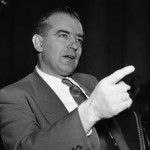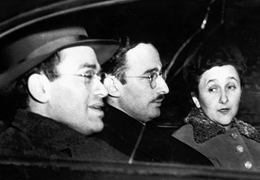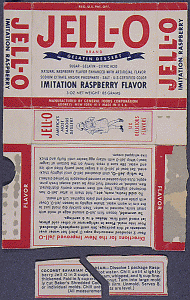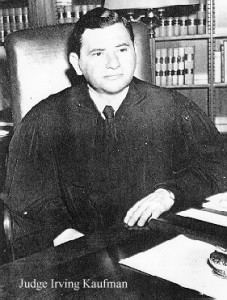Fear in the early days of the Cold War

Image of Senator McCarthy courtesy of Politico
in the From colony to superpowerGeorge Herring describes the beginning of the Cold War as a turbulent time in the history of the United States (US). During this time, the government created policies such as containment measures that influenced American foreign policy until the fall of the Soviet Union in 1991, and American citizens began to shape their views on the threat of Communism within US borders (Herring 635-637 ). . After the Soviet Union successfully detonated an atomic bomb in September 1949, the consequences of Soviet espionage in the United States became very real to many Americans. With these events in the background, Senator Joseph R. McCarthy emerged as one of the leading American politicians who insisted on arresting suspected communists in the United States and reducing the threat to the country. To achieve this, McCarthy and his allies fomented and used the fear of Communism to further their cause. Herring summarizes this point in time by writing: “A Cold War culture of almost hysterical fear, paranoid suspicion, and stifling conformity was beginning to take shape. Militant anti-communism increasingly poisoned the domestic political atmosphere…” (Hering 637). Herring’s quote underscores the power of political ideologies in the bipolar world and demonstrates the fear and contempt many Americans felt for communism.

Image of Julius and Ethel Rosenberg with Morton Sobell courtesy of the FBI
In this climate, the case of suspected nuclear spies Julius and Ethel Rosenberg took center stage as an example of the threat communists posed on American soil. The Rosenberg trial is a clear example of how the “almost hysterical fear” of Communism motivated prosecutors in that case, and much of the American public, to violate legal norms and solid evidence in order to convict and execute the Rosenbergs. As members of the Communist Party, both Julius and Ethel were politically active in the years leading up to their arrest in 1950 Legacy of an Execution: A Granddaughter’s Story co-defendant in the Rosenberg case, Morton Sobell, describes Julius and Ethel as very politically active. Sobell goes on to explain how Julius, himself, and their friends all believed that a socialist world was a better world and that the Soviet Union was the answer to bringing socialism to America. The Rosenberg’s political activity, combined with Julius’ post at the War Department during World War II, made him and his wife perfect suspects for the crime of leaking atomic secrets to the Soviets.

Image courtesy of The National Archives
Arrested on July 17, 1950, Julius Rosenberg was initially charged with leaking atomic secrets to the Soviets, and his wife Ethel was arrested on August 11, 1950 as a co-conspirator. and until their execution, the two were indeed guilty of espionage. What makes this case interesting is that although the Rosenbergs were guilty, the manner in which they were convicted and the evidence used against them reflect the fear that Herring describes as contagion in the country in the early years of the Cold War . For example, Ivy Meeropol describes in her documentary heir to an execution that one of the pieces of evidence used against her grandparents, the Rosenbergs, was a can found in their New York apartment that read “Save A Spanish Republican Child.” With this can, the investigators of the case proved the connection of the Rosenberg to the Soviet Union. Another piece of evidence used against the Rosenbergs was a Jell-O-Box, described by another Soviet spy, Ethel’s brother David Greenglass, as a way for the spies to confirm their identities if they passed information destined for the Soviet Union. A third piece of evidence provided by Greenglass of a tool used by the Rosenbergs for espionage activities was a small console in the family living room. At trial, prosecutors questioned Julius and Ethel about the table, but the two claimed they bought it from Macy’s. In the prosecution’s summary, prosecutor Irving Saypol suggested that the console was used for “microfilming” and was therefore a crucial part of Rosenberg’s espionage activities. After the trial, it was discovered that the console contained no hidden cameras and was just a regular Macy’s table.

Image of Judge Irving Kaufman courtesy of the University of Missouri-Kansas City School of Law
All three of these pieces of evidence were used to connect the Rosenbergs to the Soviet Union and to accuse them of being spies. However, the finding that the prosecution’s key piece of evidence, the console, is irrelevant to the Rosenberg’s espionage activities calls the entire body of evidence into question. In this example, we can see a snapshot of how fear of communism in the United States has degraded the quality of evidence and the overall integrity of the trial. In summary, Judge Irving Kaufman’s sentencing statement that closed the Rosenberg trial encapsulates America’s fear of Communism. In the statement, Kaufman says, “I think your crime is worse than murder. Simply premeditated murder dwarfs in comparison to the crime you committed. In committing the assassination, the criminal only kills his victim… I think your behavior in putting the A-bomb in the hands of the Russians, years before our best scientists predicted that Russia would perfect the bomb, I think already has that causes communist aggression in Korea, with the resulting casualties of over 50,000, and who knows, but millions more innocent people may pay the price for your betrayal. Indeed, by your treachery you undoubtedly changed the course of history to the detriment of our country.” Kaufman’s quote, which sentenced Julius and Ethel Rosenberg to death, underscores how frightening both the idea that the Soviets had nuclear weapons and the communist one ideology for Americans in the early years of the Cold War.



